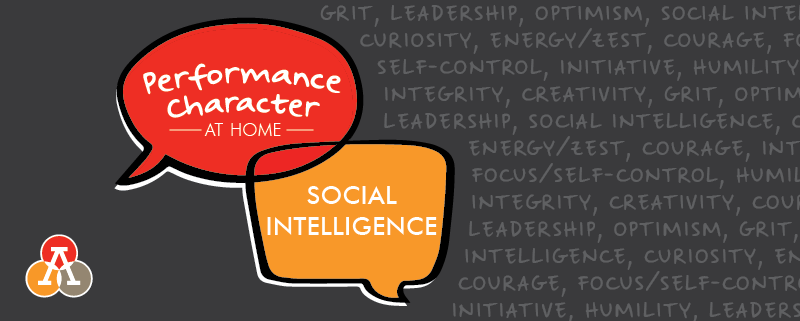“How you make others feel about themselves says a lot about you.”
– Unknown
At Athlos schools, we focus on teaching children the importance of 12 traits that we call Performance Character traits. Our Performance Character pillar recognizes the deep connection between these traits and success. The development of Performance Character is integrated into every learning opportunity, allowing students to experience this connection first hand. Traits like humility, integrity, energy, and zest become a lens through which students view their learning as about more than grades, but as learning for life.
Like all important lessons, reinforcing learning at home is a key factor to success. One of the best ways for parents to do this is to positively model the traits at home and encourage trait development. In our 12-part ‘Performance Character at Home’ blog series, we offer simple, yet effective, ways to support children’s Performance Character development. In this blog, we look at social intelligence.
 What is social intelligence?
What is social intelligence?
Athlos defines social intelligence as: Navigating relationships and interactions with respect and confidence.
How can I help my child develop social intelligence?
Social intelligence is one of the few traits that is mostly learned through simple daily social interactions with others.
Here are a few things you can do to help foster this trait at home:
- Involve your student in difficult conversations. This doesn’t mean you have to be candid about gritty details, but through age-appropriate communication, your child will develop greater trust in you and in others, practice listening skills, and be more willing to provide help wherever possible.
- Help children identify emotions. Small children feel emotions long before they can name them. Games like “Memory” (matching faces with names of emotions) and “Simon Says” help children practice identifying emotions and learn how to manage them. As children learn how to name emotions and feelings from an early age, they will become more open about discussing them with others as they get older.
- Teach children effective conflict resolution. Help teach your child to resolve disagreements with their peers by encouraging them to express their feelings clearly and calmly. Teach them how to describe the problem, express their feelings, and make a request. For example, “When you don’t let me join the game, I feel sad because I want to play too. Please invite me to play next time.”

- Build a community for your child. Encourage friendships and healthy relationships with neighbors, teachers, and community members. Foster relationships with both older and younger members of your family. As your child’s community becomes more diverse their world view expands and opens doors to greater learning opportunities.
- Find opportunities for your children to witness you serving others. Social intelligence is best learned from those who practice it, and parents are the greatest examples for their children to learn from. This can be done through volunteering at a soup kitchen or nursing home, serving a neighbor in need, and showing respect to strangers, friends and family members. Through these and other actions, your student will learn to care for and respect other people by following your example.


























